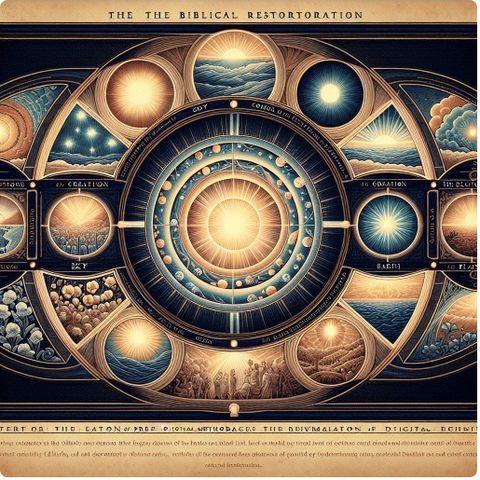Summary Of The First Five Days Of Restoration

Sign up for free
Listen to this episode and many more. Enjoy the best podcasts on Spreaker!
Download and listen anywhere
Download your favorite episodes and enjoy them, wherever you are! Sign up or log in now to access offline listening.
Description
Apparently, this vast universe we live in had been here for billions of years, but something happened to the earth and to a great deal of the creation. As a...
show moreAs a result, God moved in, the Spirit of God moved upon the face of the deep, and there was brought cosmos out of chaos.
It is time to open our hearts, minds, and souls to the Word Of GOD.
Our scripture will be coming from:
Genesis 2:4-6 KJV
[4] These are the generations of the heavens and of the earth when they were created, in the day that the LORD God made the earth and the heavens,
[5] And every plant of the field before it was in the earth, and every herb of the field before it grew: for the LORD God had not caused it to rain upon the earth, and there was not a man to till the ground.
[6] But there went up a mist from the earth, and watered the whole face of the ground.
Now it is time for our verse break down:
Genesis 2:4
These are the generations of the heavens and of the earth when they were created, in the day that the LORD God made the earth and the heavens.
“generations” here refer to “Divine divisions;” it refers to the manner in which all were created, as outlined in Chapter 1.
This presents the new name of God as “Jehovah Elohim”; this Chapter reveals Christ as Jehovah Elohim, man’s Redeemer; the First Chapter reveals Him as Elohim, man’s Creator.
We come to what many characterize as a second account of the creation of man.
This section, however, is better thought of as a more detailed account of what Genesis 1 described in the format of panorama.
The phrase these are the generations is a formulaic section-header.
This introductory statement carries the sense of “This is what happened concerning . . .”
A feature of the Bible, first occurring in the verse before us, is the use of the divine name Yahweh; this is traditionally rendered, in small capitals, as LORD in our English Bibles.
Previously, God has been called only by the Hebrew name Elohim, a title conveying His transcendence and power.
The name Yahweh, on the other hand, emphasizes His eternal existence and covenantal presence with His people.
The combined name— seen three times in Genesis 2: 4– 7 and dozens of times elsewhere as “LORD God”— is thus particularly powerful.
This scripture refers to the history or account of the generations of the heavens and of the earth.
Where did Moses obtain this account so different from the puerile and absurd fictions of the heathen?
Not from any human source, for man was not in existence to witness it; not from the light of nature or reason, for though they proclaim the eternal power and Godhead by the things which are made, they cannot tell how they were made.
None but the Creator Himself could give this information, and therefore it is through faith we understand that the worlds were framed by the word of God (Hebrews 11:3).
Genesis 2:5
And every plant of the field before it was in the earth, and every herb of the field before it grew: for the LORD God had not caused it to rain upon the earth, and there was not a man to till the ground.
The second day of creation is addressed here, which obviously preceded day three, when plant life was developed.
It seems that rain came to the Earth on day three, which caused the Earth to “bring forth grass, the herb yielding seed, and the fruit tree yielding fruit after his kind.
All of this was before man was created, showing that he had nothing to do with the creation, that being altogether of God.
The language here suggests that the writer is not looking back to the creation of vegetation in Genesis 1, but rather is previewing the cultivation that will occur in the Garden of Eden and after the fall.
Two features lend support for this view.
First, the phrase herb of the field appears again in Genesis 3:18 to designate what humanity will eat after the fall.
Second, whereas the rain anticipated in verse 5 will be a blessing, it is an instrument of judgment in Noah’s day (7:4).
These verses thus may set the stage for the more detailed account of man’s creation that follows, which complements the general description in 1:26, 27.
Genesis 2:6
But there went up a mist from the earth, and watered the whole face of the ground.
This pertains to day two of Creation; at that time, day two, there went up a mist from the Earth, which prepared the Earth for the seed which God evidently planted on the beginning of day three, and which rain on day three then brought forth.
The exact nature of the mist that rises from the earth is unclear.
The underlying Hebrew word occurs in the Old Testament only here and in Job 36:27, there translated “vapour.”
Taken together, the idea may be that of evaporated water that condenses to a liquid state to water the whole face of the ground.
Perhaps the water mixed with dust provides clay the Lord God uses to create man.
All right get those phone lines buzzing by the mighty dozens and let us know what you think of today's episode.
📱(704) 471-8526
To GOD Goes The Glory
The Glory
Glory👃🏾
Information
| Author | Jerry M. Joyce |
| Organization | Jerry Joyce |
| Website | - |
| Tags |
Copyright 2024 - Spreaker Inc. an iHeartMedia Company
